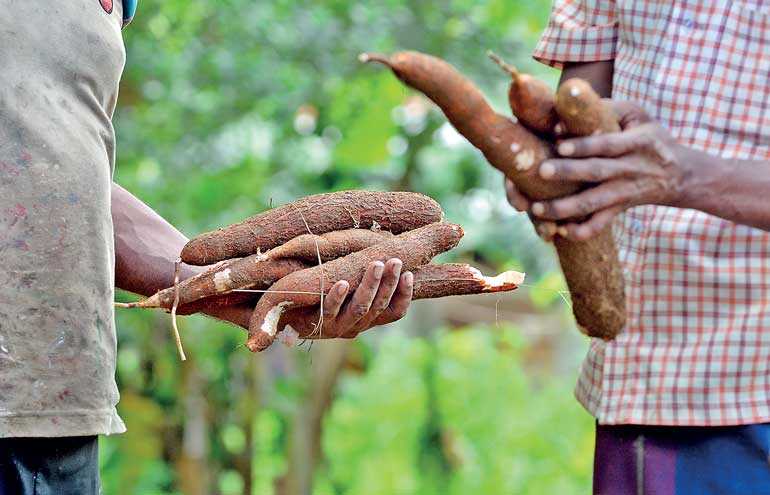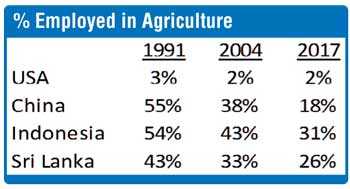Wednesday Feb 18, 2026
Wednesday Feb 18, 2026
Tuesday, 4 December 2018 00:00 - - {{hitsCtrl.values.hits}}

 The new Government recently announced some concessions and reliefs for the Agriculture sector. It is a slogan among all political parties, particularly closer to elections, to develop Agriculture and provide relief and concessions to farmers. Politicians are quick to move back in history and refer various kings who developed the Agriculture sector and promise to bring back those eras.
The new Government recently announced some concessions and reliefs for the Agriculture sector. It is a slogan among all political parties, particularly closer to elections, to develop Agriculture and provide relief and concessions to farmers. Politicians are quick to move back in history and refer various kings who developed the Agriculture sector and promise to bring back those eras.
Farmers want better jobs for their children
The truth is, the world has advanced light years from that era. It is a pity that even programs in local media delves on distant past glories in Agriculture while paying little attention to where the world is at present. Most countries take pride in their advancements in technology based industries, and hardly any country takes pride in the number of farmers they have. We have heard of sons of farmers becoming presidents of countries but do we hear of sons of presidents becoming farmers?
The simple fact is, employment in the Agriculture sector is at the bottom of the pyramid of employment. A farmer’s dream would be to educate their children so that they could get stable, permanent employment. That’s a fact.
China’s phenomenal shift in employment
Statistics show that China which had 55% of its employed population in Agriculture in 1991 has reduced that to 18% in less than three decades. That’s a phenomenal shift in a relatively short time span and China’s economic development during this period is well known. What that means is, children of farmers have found employment in Industry and Services sectors which provided better income and quality of life.
In contrast, Sri Lanka which had a lower proportion of population in Agriculture in 1991 (compared to China) has a higher proportion (compared to China) in Agriculture now. It is known that Sri Lankan economy grew at a much lower pace than China during this period. This underlines the fact that the Industry and Services sectors in Sri Lanka have not grown sufficiently during this period and as a result better employment opportunities have not opened up for farmers.
Alternative employment need to be sustainable
Another important factor to note is that the alternative employment opportunities should be value adding to the economy to achieve long term economic development. The shift of employment from Agriculture in Sri Lanka in recent times may have occurred through an increased number of tuk-tuk drivers.
The need for a larger number of tuk-tuk drivers is actually a reflection of the poor transport system in the country. Hence a more efficient transport system may have resulted in the proportion employed in the Agriculture sector to be higher. One could argue that in such a scenario the level employed in Agriculture would have been closer to 30%, which further exposes the slowness in which Sri Lanka has progressed in creating value adding employment opportunities in Industry and Services sectors.
Employment in Agriculture in the developed world
If the politicians really want to help the farmers, they should create the environment to provide higher paying, stable jobs. That could happen if industries are developed through tax concessions, subsidies and development of relevant infrastructure by the Government.
The statistics for USA is a useful yardstick. Once sufficient opportunities open up in Industry and Services sectors (or when a country becomes a “developed” state), the employment in Agriculture should shrink towards less than 5% of the employed population. Sri Lanka is many decades away from achieving that and may not achieve it at all if the current trend continues. China is likely to get there in a decade or two.
Develop Agriculture while eliminating farmer
This is not to say that we should abandon Agriculture. On the contrary, as countries develop and when farmers shift to stable, higher paying jobs, equipment and technology has taken over the role of the farmers in the developed countries.
That’s why the number of workers needed to produce the same harvest in a developed country would be far less compared to that of a developing country such as Sri Lanka. The fact that USA employs less than 2% of employed population in Agriculture sector despite being the global leader in producing Wheat and Corn underlines this point.
Essential to continue with subsidies in the interim
This is by no means to say that support for Agriculture should be abandoned prematurely. Reducing subsidies and other concessions for farmers in the absence of alternative employment opportunities is not only foolish but inhuman as well. Not to mention the obvious political repercussions.
Clearly such support should continue until alternative employment opportunities surface. As such employment opportunities open up, investments in technology should pick up to reduce the need for manpower in Agriculture. As the labour gradually shifts from Agriculture to Industry and Services, the vacuum in Agriculture should be taken up by equipment without letting the agricultural output to suffer. Food security and development of Agriculture is crucial for economic stability of any country in the modern world.
The politicians have historically tended to support Agriculture with an eye on the voter base (as the sector employs a large number of voters). However what they should actually do is to create higher income employment opportunities for farmers in other spheres of the economy, while technology and equipment drives growth in Agriculture.
(The writers can be contacted via [email protected])